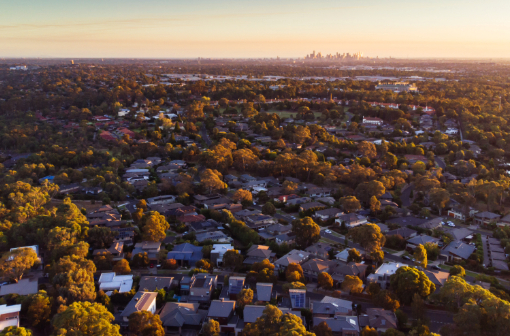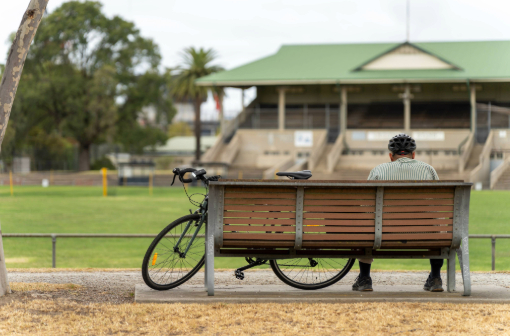“There's always going to be times when things come off the rails and I feel secure that I've got people I could turn to. That's the key sign for me that I know I'm in a rich relationship.” – Kevin.
Key points
- Maintaining relationships is a critical part of our overall wellbeing.
- The Australian Unity Wellbeing Index shows how strong relationships can help provide a sense of security.
- Close relationships bring a sense of purpose, value and happiness to our lives.
Think of the things that make you happy. Is it catching up over coffee with a friend? Having dinner with your partner, or playing with your kids? Or is it competing in a close-fought pub trivia competition with your teammates? Whatever you came up with, we’d guess that many of these activities included a person who’s important to you.
Our relationships – whether they’re with a partner, friends, family or colleagues – play a vital role in our everyday lives, reminding us that we’re loved and protecting us from feeling alone.
But how do those relationships affect our overall wellbeing? And how do we know if we already have close relationships in our life?

Why relationships matter
Humans are social creatures, and we need social outlets and connections to thrive and feel valued. Active and healthy relationships with other people stop us from feeling isolated and create a sense of security that, no matter what life throws at us, we don’t have to face it alone.
If we don’t have strong relationships in our lives, the opposite can feel true – we feel unloved and unimportant, and less equipped to tackle life’s obstacles.
As a result, our intimate relationships are crucial to our overall wellbeing. They influence how we rate our happiness, and help us to maintain a strong connection to our community, which also supports better wellbeing.
In partnership with Deakin University, Australian Unity has been tracking the wellbeing of Australians for more than 20 years through the Australian Unity Wellbeing Index. The Wellbeing Index identifies relationships as one of the seven “domains”, or areas, of wellbeing, along with standard of living, health, community connectedness, safety, achieving in life and future security.
Indeed, the Wellbeing Index goes one step further than this, identifying intimate relationships as part of the “golden triangle of happiness”, along with financial control and a sense of purpose.
Leaning on your support network: Kevin’s story
If recent history has taught us anything, it’s that life can throw any number of obstacles at us without warning. Humans are a very resilient species, and that resilience is built off the back of strong and mutually supportive relationships.
According to the Australian Unity Wellbeing Index, strong relationships with those you can confidently share your thoughts, secrets, hopes, dreams and fears with provide an important sense of security and a defence against life’s challenges.
When Kevin became a father for the first time, he admitted to feeling overwhelmed at the changes life threw at him. From sleepless nights to the responsibility of building a connection with his newborn son, he says he struggled to really “feel like a dad”.
But the support of his close friends helped to lift the burden, and he was able to see the light at the end of the tunnel.
“I've always been lucky enough to have a core group of friends that I could reach out to, who kind of took me aside and just said, ‘How's it going?’” he explains. “There's always going to be times when things come off the rails and I feel secure that I've got people I could turn to. That's the key sign for me that I know I'm in a rich relationship.”
Nurturing your relationships
So how do you make sure you have intimate relationships in your life? And what happens if you don’t have a partner?
When we talk about intimate relationships, we don’t just mean the person allowed to visit you during a pandemic. The relationship doesn’t have to be a romantic one – closeness, support and trust is the key to building “intimacy”. Having this level of intimacy with someone (or multiple people) means you can rely on them, and you can share your ideas, opinions, fears and successes openly.
Specifically, good relationships that contribute to our wellbeing are defined by:
- A sense of trust
- Mutual support
- Feelings of affection and (romantic or non-romantic) intimacy.
These types of relationships can come from our friends, our family, workmates or, yes, partners. Whoever your relationships are with, however, it’s crucial to nurture them and strengthen them. We can tend our relationships by spending time together, making space to listen to each other’s hopes and dreams, and by offering support when times are tough. By regularly and communicating their importance in your life, you build your relationships and, in turn, build and maintain your wellbeing.
Intimate relationships bring us a sense of security, purpose, value and happiness. They need to be nurtured in order to thrive, and require mutual respect, love and support from all parties involved. But when you strike that balance right, those relationships have an unyielding positive effect on our wellbeing.
Disclaimer: Information provided in this article is of a general nature. Australian Unity accepts no responsibility for the accuracy of any of the opinions, advice, representations or information contained in this publication. Readers should rely on their own advice and enquiries in making decisions affecting their own health, wellbeing or interest. Interviewee titles and employer are cited as at the time of interview and may have changed since publication.



